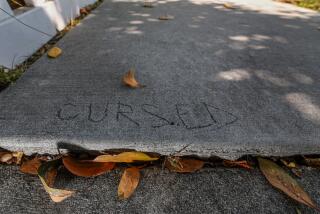It’s No Joke
Predictably, last weekend’s “Comic Relief” telethon had funny lines from funny people seriously seeking to help cure a problem that is hardly funny: homelessness. But long after Robin Williams’ best material is forgotten, the images that will linger are from photographs of the homeless themselves--some hardened drifters, to be sure, but also the haunted faces of fathers and mothers who cannot provide shelter for their children.
Others, less well known than the stars, are also taking steps to help Los Angeles’ biggest concentration of the homeless on Skid Row. Two significant developments have occurred.
A citizens’ committee, mixing activists and leading downtown lawyers and executives, has been created to protect Skid Row now that Edward Helfeld, who dealt with the problem with great sensitivity, has been pushed out as head of the Community Redevelopment Agency. The group sees Skid Row squeezed from all sides by the prospect of development without parallel preservation of existing housing and improvement of safety for area residents.
The group’s membership ensures that its phone calls will be returned, including as it does attorneys Robert E. Carlson, Warren L. Ettinger and Ronald L. Olson, all of leading downtown law firms; Robert B. Egelston, chairman of the Capital Group, and Robert W. Wycoff, president of Atlantic Richfield; Alice Callaghan of Las Familias del Pueblo, Jeff Dietrich of the Catholic Worker and Jill Halverson of the Downtown Women’s Center. Their mission is to show that urban renewal can address the needs of the poor while encouraging economic growth.
On an official front, the city Police and Fire commissions have endorsed a report by commissioners Barbara Lindemann Schlei and Ann Reiss Lane aimed at improving safety and health conditions on Skid Row. Police Chief Daryl F. Gates has already acted on one of their recommendations by naming Sgt. Bill Tiffany as police coordinator on Skid Row. He wants to provide a more visible police presence, increase arrests for assaults and drug sales, and clamp down on drug sales in hotels and parks.
In general, the report asks county government to make better use of the money that it spends on drunks and drug addicts. For example, county leaders must investigate the lack of proper provisions for public inebriates. Commissioners Schlei and Lane concluded that no Los Angeles County facility for the treatment of public drunks meets state standards.
At present, police deliver drunks to a reception center operated under a county contract by the Volunteers of America at the Weingart Center. The drunk must voluntarily choose to stay. “No evaluation, medical services, treatment beds, food or showers are provided, as required” by the state code, the report says. There are also only limited grounds under which public inebriates can be arrested; even for those who can be, there is only limited room in the central jail in facilities meeting state standards. Other county areas also lack proper facilities, so drunks there are sent to Skid Row, where facilities already are stretched.
This report draws the dimensions of the problems yet to be solved on Skid Row and throughout the community. It documents the harsh existence for people without much clout in city and county government, but with no place else to turn.
More to Read
Sign up for Essential California
The most important California stories and recommendations in your inbox every morning.
You may occasionally receive promotional content from the Los Angeles Times.









